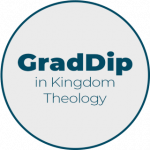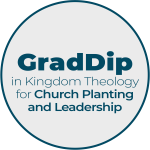GRADuate DIPloma
KINGDOM THEOLOGY
This two year part-time programme is aimed at those who wish to go deeper in their faith and have previously studied at university level.

If you have a degree or qualification in something other than theology or have the relevant ministry experience, then this could be the programme for you!
Graduate Diploma in Kingdom Theology

The Graduate Diploma in Kingdom Theology offers a study of the major theological disciplines, including Biblical studies, Church history, spirituality, Christian beliefs, and leadership & ministry. The Graduate Diploma is designed to equip graduates (in subjects other than theology) for servant leadership and mission, and also acts as an entry qualification for the MA in Kingdom Theology.
This programme is validated by the University of Chester.
This programme is validated by Birmingham Newman University.
Applications are now OPEN.
Please contact us if you are interested or have any queries: 0300 040 6200 / info@wtctheology.org.uk.
PROGRAMME CONTENT*
Modules for YEAR 1 are the same for both tracks of the Graduate Diploma programme:
Do you want to go on a transformational journey in which your little life story is caught up in the Story of the Ages? Then welcome to a course on going deeper into the study of the Old Testament, a Story which begins with Creation and ends with the prophecies of a new world in which everything has been transformed! Here is a place where you will obtain a better compass for your own journey as you see more clearly your way in the light of the Torah, the calls for justice from the prophets, the insights of the sages, and the praises and lament of the psalms. Welcome to a journey of transformation!
This module introduces students to the historical, theological and literary content of the New Testament. It will focus especially on the challenges of reading various and distinctive styles and themes across New Testament genres and authors. Attention is paid to the practices and beliefs of Christianity in the context of Second Temple Judaism and the first century church. Selected texts provide case studies that illustrate the historically conditioned character of early Christianity. There is a consideration of both the exegetical value and the critical challenges that an historical examination of the New Testament produces. Particular attention is paid to questions of Christology, eschatology, soteriology, Jesus’ spirituality, the ‘Kingdom of God’, the meaning of Jesus’ death and the relationship between these themes and the shape of Christian discipleship and ministry.
This module gives students the opportunity to delve into the fascinating questions around the person and work of Jesus Christ. Who do people think Jesus is? What does it mean for God to have become man and dwelt among us? What are the implications of the Incarnation for the church and the world? In this module we focus on the biblical and early church portraits of Jesus, questions around how one person can be the God-man, and the debates around orthodox views of Christ with a particular focus on the development of ideas around the identity of Jesus in the first few hundred years of the church.
This module covers biblical, theological, and historical foundations for spiritual formation and leadership, equipping students with different perspectives on discipleship and models of formation through the ages. The module covers fundamental doctrines of Christian identity through the idea of humanity made in the image of God, as well as discussion on how those ideas shape us as followers of Christ and leaders in any sphere. Students are encouraged to explore models of spiritual formation and leadership in relation to concepts of the kingdom, community, creation care, and the poor and to apply their learning to their own contexts.
Modules for YEAR 2:
This module (included in both tracks of the GradDip) builds on the foundations of the On the Incarnation module, as we go deeper into questions of the identity of Jesus and what it means to be ‘saved.’ We study some of the developments through history in thinking about Jesus, as well as the biblical perspective on the incarnation, salvation, atonement, and the second coming. Students have the chance to think through what all of this means for modern day discipleship, life, and engagement with the world in mission.
There are so many books and so much material now on leadership it makes your head spin. Perhaps that’s strange when you consider that Jesus didn’t encourage us so much to lead as to follow! This module will teach how it’s in following more closely you’ll find you lead better. The lectures will focus mainly on Old Testament characters and how God turned their weakness to strength. We will see how each of us can develop their leadership potential to enable flourishing in every sphere of influence to occur. References are drawn from both influential Christian leaders and the best that the business world has to offer.
This module aims to explore how the Gospel writers read the scriptures of the Hebrew Bible and its respective Greek counterparts. The goal is to aid students in how to access the scriptures of the Old and New Testament in the light of Christ. To this end, we will closely observe how the writers of the Gospels themselves “read” their own scriptures.
Christian spirituality is not simply a private, contemplative affair; it is a dynamic and creative outworking of Christian belief in culture. Its history is not merely a record of the past, but a powerful testimony of living faith down through the ages. As such, this course is about breathing new life into old bones. We will stand alongside the martyrs Felicitas and Perpetua on the dusty arena floor of ancient Carthage, join Francis of Assisi’s ragtag poor in the hills of medieval Umbria, and hear the heart of William Wilberforce’s insistent calls for liberation in English Parliament. And as we come to learn more about the living faith of our brothers and sisters in Christ, we will seek to learn more about ourselves and the way in which our faith might be lived out in the present.
*WTC reserves the right to change modules in line with the terms and conditions of the Student Contract. Any changes will be aligned with delivering a qualification at this level in Kingdom Theology.
The Graduate Diploma is assessed by the submission of six essays throughout each year.
For full programme delivery details, please visit the Programme Delivery page.
Church Planting & Leadership Track
Graduate Diploma students have the option to study on the specialist Church Planting & Leadership Track in their second year. This Graduate Diploma is designed for men and women embarking on the church planting journey, or church planters who are seeking deeper theological engagement to nourish their existing ministry.
CLICK HERE for GradDip CPL.
Find out more about our Flexi-GradDip:
WTC offers both programme tracks as a Flexi-GradDip, for students in the UK who live more than 1.5 hours travel time away from an existing WTC Hub.
CLICK HERE for Flexi-GradDip.
ENTRY REQUIREMENTS
This two year part-time programme is aimed at those who wish to go deeper in their faith and who have previously studied at University level.
- • Generally, a Bachelor’s degree is required.
- • For those without a Bachelor’s degree, but with professional qualifications or relevant experience, please contact us to discuss your eligibility for the Graduate Diploma.
- • If English is not your first language, please see the English Language requirements on the Study With Us page.
All students have access to the study skills resources and learning development support we provide at this level.
FEES
The cost of this programme is £4,400 per year for each of the two years. This includes a £400 non-refundable deposit to confirm your place after receiving an offer.
Applications are now OPEN.
Please contact us if you are interested or have any queries: 0300 040 6200 / info@wtctheology.org.uk.
Concerned about finance?
Our friends Stewardship may be able to help you to raise your financial support. The Partner Account for Individuals will help you manage your financial support for living costs and personal ministry expenses in one place. You’ll get a range of tools to manage your support, connect with your supporters and develop a team of ministry partners. Find out more here.
PARTNERING WITH THE CHURCH TO
EQUIP AND SEND THE WHOLE PEOPLE OF GOD
connect with us on
LIFE-GIVING THEOLOGY
Come Find The Programme That Best Suits You
WTC THEOLOGY
© 2024 WTC (Reg. No. 6506007)
WTC is a Registered Charity (No. 1123573)
reCAPTCHA (v3) is active on this site
Click HERE for WTC’s Privacy Notice
Click HERE for WTC’s Cookie Policy




